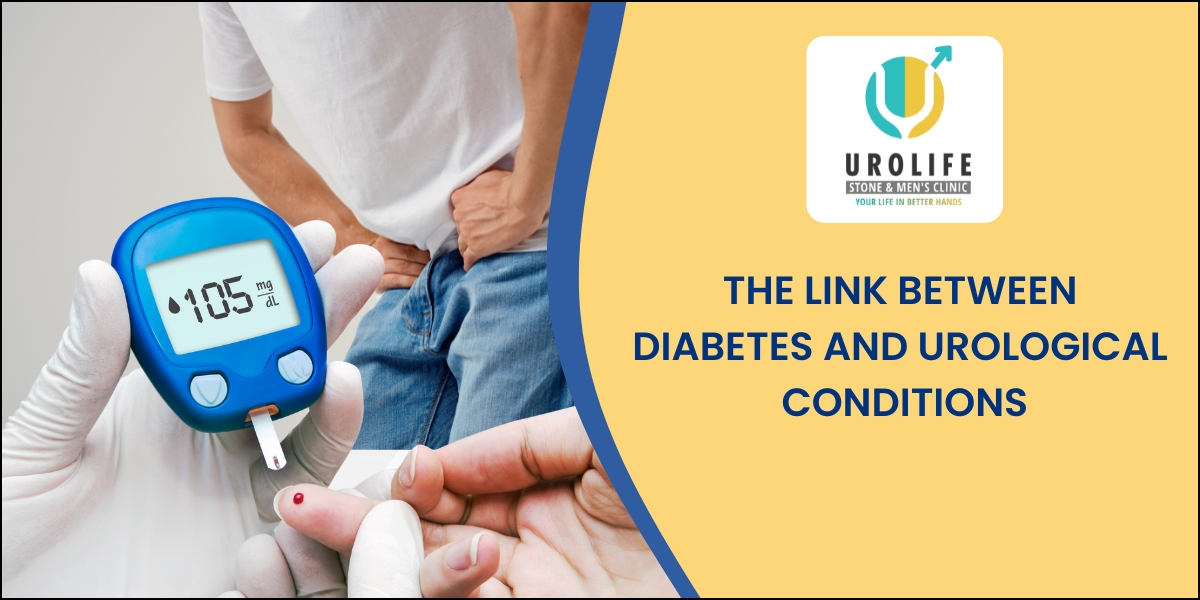Diabetes is a widespread health condition affecting millions, primarily known for its impact on blood sugar levels. However, its effects are far-reaching, damaging nerves and blood vessels throughout the body. One of the most significant, yet often overlooked, areas affected is the urological system. For many, the first sign of poorly managed diabetes is a urological issue.
This intricate link means that urological health is a critical barometer for diabetic health. Understanding this connection is the first step toward effective prevention and management.
How Diabetes Damages Urological Health
Prolonged high blood sugar levels can lead to two primary types of damage:
-
Diabetic Neuropathy: High glucose can injure the delicate nerves that control your bladder function and sexual response. This nerve damage can prevent the bladder from emptying completely, lead to loss of sensation, or cause overactive bladder symptoms.
-
Vascular Damage: Diabetes harms blood vessels, impairing blood flow. This is crucial for erectile function in men and can also affect the health of the kidneys and urinary tract.
Common Urological Conditions Linked to Diabetes
-
Erectile Dysfunction (ED): This is one of the most well-known connections. Reduced blood flow and nerve damage make achieving or maintaining an erection difficult. In fact, men with diabetes are three times more likely to experience ED.
-
Urinary Tract Infections (UTIs): High sugar in the urine creates a perfect breeding ground for bacteria. Additionally, a neurogenic bladder that doesn’t empty fully allows urine to stagnate, further increasing infection risk.
-
Overactive Bladder (OAB) & Incontinence: Nerve damage can cause bladder muscles to become overactive, leading to a frequent, sudden, and strong urge to urinate, sometimes resulting in leakage (urge incontinence).
-
Retrograde Ejaculation: This occurs when nerve damage causes semen to enter the bladder instead of exiting the body during orgasm. While not harmful, it can affect fertility.
-
Kidney Disease (Nephropathy): The kidneys’ filtering system is made up of tiny blood vessels. Diabetes can damage this system, leading to diabetic nephropathy, a serious kidney disease.
Prevention and Management: Taking Control
The good news is that proactive management can significantly reduce the risk and severity of these conditions.
-
Blood Sugar Control: This is the single most important factor. Maintaining your HbA1c within your target range helps prevent nerve and blood vessel damage.
-
Healthy Lifestyle: A balanced diet, regular exercise, and maintaining a healthy weight support overall diabetic control and urological health.
-
Open Communication: Do not dismiss urological symptoms as a normal part of aging or diabetes. Discuss them openly with your doctor.
-
Seek Specialized Care: A urologist specializes in diagnosing and treating these specific conditions. They can offer tailored treatments, from medications and pelvic floor therapy to advanced surgical options.
If you are managing diabetes and experiencing any urological symptoms, seeking expert advice is crucial. Early intervention can preserve your quality of life and prevent complications.
Meet Dr. Irfan Shaikh – Top Urologist in Pune, Maharashtra
For patients in Pune and across Maharashtra navigating the complex challenges of diabetes-related urological conditions, Dr. Irfan Shaikh stands out as a leading expert.
Recognized as one of the best urologists in Pune, he utilizes the latest diagnostic technologies and evidence-based treatment plans tailored to each patient’s unique needs.
If diabetes is affecting your urological health, consult Dr. Irfan Shaikh, a renowned urologist in Pune, for expert guidance and advanced care to improve your quality of life.
Frequently Asked Questions (FAQs)
1. Can diabetes cause bladder problems?
Yes, diabetes can cause nerve damage (neuropathy) that affects bladder control, leading to issues like overactive bladder, incontinence, or incomplete emptying.
2. What are the symptoms of a diabetic bladder?
Common symptoms include frequent urination, a urgent need to urinate, waking up multiple times at night to urinate (nocturia), urine leakage, and a weak urine stream.
3. Can diabetes cause UTIs?
Absolutely. High glucose levels in urine provide food for bacteria, significantly increasing the risk of frequent and more severe urinary tract infections.
4. Is erectile dysfunction from diabetes reversible?
While not always fully reversible, ED caused by diabetes can be effectively managed. Improving blood sugar control, alongside treatments like oral medications (PDE5 inhibitors), can often restore function.
5. How can I prevent urological issues with diabetes?
The best prevention is tight blood sugar control through diet, exercise, and medication. Regular check-ups and immediately discussing any new urological symptoms with your doctor are also essential.
